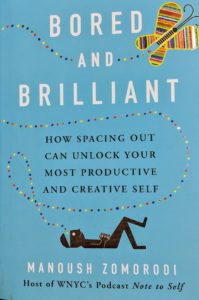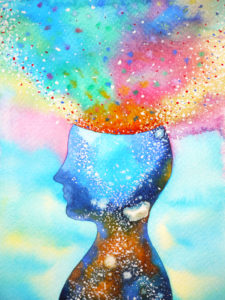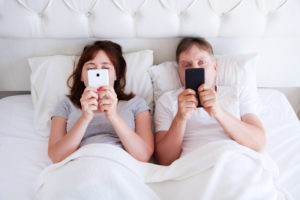Bored Enough?
Are you having trouble making an important decision? Figuring out an answer to a significant life question?
It could be that part of the struggle stems from the fact that you are not bored enough.
Yes! Not bored enough.
When was the last time you were really, truly, thoroughly bored?
This may be difficult to remember, actually. In today’s world, with our smart phones always within reach, the experience of boredom is easy to avoid. There is always a distraction available, a person to text, a game to play, a twitter-feed to follow.
And, if you do remember feeling bored, can you recall what you did to relieve that boredom?
Chances are, you reached for your phone.
Is There Any Value in Boredom?
What’s wrong with reaching for your phone? Why shouldn’t you do a quick Facebook check, get an update on the news? What value is there to be had from boredom, anyway?
Manoush Zomorodi, host of the popular WNYC podcast Note to Self, answers these questions and more in her book Bored and Brilliant (https://smile.amazon.com/Bored-Brilliant-Spacing-Productive-Creative/dp/1250124956/ref=sr_1_fkmrnull_1?crid=OHC1MHCXFOGN&keywords=bored+and+brilliant+by+manoush+zomorodi&qid=1554319541&s=gateway&sprefix=bored+and+b%2Caps%2C129&sr=8-1-fkmrnull).
 She starts with a bit of her own background and how she became interested in exploring boredom and its benefits.Zomorodi had me at her first sentence: “My son and the iPhone were born three weeks apart, in June 2007.” Love that!
She starts with a bit of her own background and how she became interested in exploring boredom and its benefits.Zomorodi had me at her first sentence: “My son and the iPhone were born three weeks apart, in June 2007.” Love that!
“My brain was always occupied, but my mind wasn’t doing anything with all the information coming in.”
She goes on to describe what it was like during those first few months, transitioning from a busy, fulfilling job to being home full time with a newborn:“I was the most bored I had ever been in my entire life.”
Most women who have had a baby can relate. Yet, as we also discovered, this precious time can be magical. It was for Zomorodi—once she became accustomed to the new, slower pace; noticed what was around her; and developed a deep and wonderful bond with her infant son.
When Zomorodi went back to work, the stress returned; she was drawn to her phone more and more and to activities in which she never thought she’d engage—one of her biggest time drains was Two Dots, a game that she’d play late into the night.
“I found that I wasn’t using my smartphone to connect. I was using it to escape,” she writes. “My brain was always occupied, but my mind wasn’t doing anything with all the information coming in.”
Facebook? Ha! GPS? Never.
Zomorodi became interested in what this draw to information (and to Two Dots) was all about and began to look at the effects of digital devices on our lives. In 2015, Zomorodi set out to do an experiment: She asked her podcast listeners to join her on journey of discovery—The Bored and Brilliant Project.
Over 20,000 people signed up for a 7-day/7-challenge adventure to reclaim some of their time, to “space out,” and to “embrace boredom as a productive state of mind.” The book is an examination of that experiment and of boredom and digital hijacking (my word) in general.
If you read my post “Progress?” (https://dianegottlieb.com/my-mom-is-with-me/), you already know that I have my reservations about “devices.” While I could not live without my laptop (that may be an exaggeration), I am very leery of devices—including my phone—and try to forgo electronics whenever I can. Just saying.
Still, it is amazing how dependent I and the rest of us have become on our little hand-helds. I was one of the last hold-outs on the cell-phone; it took me forever to give up my flip phone (I finally gave in when my per-diem job offered its gigs through email). Texting? I was determined not to succumb to “new and improved” method of communication. Facebook? Ha! GPS? Never. Famous last words.
In this age of information, of instant gratification, of constant stimulation, we have been indoctrinated to believe that we should never be uncomfortable—or, at least, that we never have to be.

Most of those reading this post can remember the days of phone booths, of maps, of letter-writing. We ate without the help of the microwave; we typed on Smith Coronas, and we got our news and weather on channels 2, 4, and 7—once a day, twice at most.
Were those the “good old days”? Maybe, maybe not. But were they really that much worse? Things took more time, but it seems as though we had enough time to spare. I, for one, was not racing in the same way I do now. What about you?
In her book, Zomorodi cites several psychologists’ and neuroscientists’ views on devices and on boredom. The consensus seems to point in the direction of unplugging more, especially if we want to get in touch with our creative sides (not to mention lower stress and avoid developing ADHD).
Dr. Jonathan Smallwood, a professor of cognitive neuroscience: “In a very deep way, there’s a close link between originality and creativity and the spontaneous thoughts we generate when our minds are idle.” Idle and bored!
If boredom is a catalyst for creativity, then why does it get such a bum rap? Why, as Maria Popova of the wonderful newsletter Brain Pickings (https://www.brainpickings.org) say, “’We treat boredom as Ebola, something to be eradicated.’”
Most probably because boredom can make us feel uncomfortable. And in this age of information, of instant gratification, of constant stimulation, we have been indoctrinated to believe that we should never be uncomfortable—or, at least, that we never have to be.
We created our own way out of boredom.
In those “days of old” (less that twenty years ago—but doesn’t it feel like a lifetime?), we had to create our own way out of boredom. That’s where the magic of being bored lies.
Zomorodi quotes Dr. Sandi Mann, psychologist and author of The Upside of Downtime: Why Boredom is Good, describing the process: “When we’re bored, we’re searching for something to stimulate us that we can’t find in our immediate surroundings. So we might try to find that stimulation by our minds wandering …you start thinking beyond the conscious and into the subconscious. This process allows different connections to take place.”
Before our devices, we would more often look inward. When we were bored and the outside world was not offering us immediate stimulation, we looked to ourselves, our inner selves, our own thinking brains. We tapped into memories, our imaginations. (Remember those?) We reflected. We created our own way out of boredom. (I know I said this before, but it bears repeating!)
When was the last time you felt rewarded by a bright, bold idea?

Studies suggest that if we want to maximize our creativity, we not only have to embrace boredom when we encounter it but regularly invite quiet time into our experience. In her March 16th article in the New York Times, “Stop Letting Modern Distractions Steal Your Attention” (https://www.nytimes.com/2019/03/26/smarter-living/stop-letting-modern-distractions-steal-your-attention.html), Ana Goldfarb speaks to Dr. David Rock, the C.E.O. of The Neuroleadership Institute on the issue of over-stimulation and creativity:
“‘Our ‘Aha moments’ are literally quiet brain signals,’ said Dr. Rock. ‘To facilitate more flashes of inspiration, make space for these serene moments. Being ‘always on’ and jam-packing your schedule with demanding cognitive tasks impedes the number of big ideas you’ll be able to create. Those bright, bold ideas are the ones that motivate us and can feel the most rewarding.”
When was the last time you felt rewarded by a bright, bold idea?
Goldfarb also spoke to Catherine Price, the author of How to Break Up with Your Phone and founder of Screen/Life Balance. Ms. Price: “‘If you want to think deeply or have any sort of creative insight, you must give your brain breathing room. It’s not wise to always be in ‘intake mode,’ which is what can happen when mindlessly scrolling through emails and social media feeds. To form long-term memories, you need to create new pathways in the brain, a process easily disrupted by distraction.’” She adds, “‘Sadly, our smartphones are built to distract us.’”
“The only people who refer to their customers as ‘users’ are drug dealers and technologists”
They are built to distract us! Older generations have always been skeptical of new inventions. The TV, at its inception, for example, was considered a scary, destructive intrusion. (I might argue that in some ways, it is!) But we are truly living in a new age. Our devices, our technology have become all-consuming. In the new Information Age, “production is no longer measured in physical quantities as it was in the Industrial Age but by data and other intangible elements.” And is it just a coincidence that “the only people who refer to their customers as ‘users’ are drug dealers and technologists”? I think not!
As consumers, we are up against some big odds. Technologists are hiring experts in the field of applied neuroscience, who help them use brain science to develop products that will stimulate consumers, keep consumers’ attention, and bring consumers pleasure.
Zomorodi spoke to Tristin Harris, a past Google Design Ethicist and Product Philosopher, who sees the similarities between the tech and food industries. Food corporations have made billions of dollars by exploiting our preferences for sugar, salt, and fat. Harris believes that the “current prevalent digital business model is a game to get people’s attention, ‘a race to the bottom of the brain stem to seduce people’s psychological instincts.’” A race to the bottom? I hope we all lose!
 If you decide to downsize your technology intake, you will be in good company
If you decide to downsize your technology intake, you will be in good company
So … what can we do? Go on a technology diet?
I think so! Trim the fat! When we consume all that’s out there, we feel stuffed—we’re feeding our minds with empty “calories” or overdoing the good stuff!
If you decide to downsize your technology intake, you will be in good company. Bill Gates famously takes two “think weeks” a year, alone—no family, friends, technology—at a secluded waterfront cabin in the Pacific Northwest. He credits these weeks with his coming up with some of his best ideas for both Microsoft and his foundation.
Now … we may not have a secluded waterfront cabin in the Pacific Northwest, or anywhere else, to disappear to for two weeks, but we certainly can cut down on our technology consumption.
Get with the Program!
Zomorodi’s book provides a great start. I’ve summarized her 7day/7 challenges below:
- Day One: Track your digital habits—ALL of them! EVERY time you pick up that phone—every time!
- Day Two—Keep your phone out of sight anytime you are moving—walking, driving, on a bus or train. That’s all, just give them up when you’re moving
- Day Three—NO pictures today—not a one!
- Day Four—This one may give you pause—ready? Delete the app you think you can’t live without. Lose your albatross. Zomorodi promises you won’t die!
- Day Five—Take what Zomorodi calls a “fakecation.” Keep your regular schedule BUT take a pre-determined time off-line.
- Day Six—Observe! “Reclaim the art of noticing.” Go out somewhere in public and pause. “Imagine what a single person is thinking, or zoom in on an un-inevitable detail. Just make one small observation you might have missed if your nose were glued to a screen … noticing in the first step in creating.” AMEN!
- Day Seven—Put it all together! This one has multiple steps.
- “Identify an aspect of your life that you’ve been confused by, avoiding, or downright terrified to think about.” It can be large or small—but it must be that thing that “whenever you think about solving it, you always seem to end up on Facebook instead.”
- 30 minutes—NO distractions. Do nothing or do a mindless task (Zomorodi suggests watching a huge pot of water boil or writing the numbers 1,0,1,0 on a piece of paper over and over again.)
- Immediately after you’ve completed Step 2, and are “mind-numbingly bored,” sit down with paper and pen and begin to solve the problem you identified in Step 1.
Are You Ready to Take the Challenge?
I actually cut down my own technology consumption quite a bit on January 1 (along with weekday alcohol and sweets). I don’t look at my phone for at least an hour after I wake up and at least an hour before I go to bed. (I’ve only strayed from this regimen a few times since then and only to answer a call or a text–from the kids, of course.) I’ve cut down on my news binging and email-checking, and I have to say that I am feeling less harried and more grounded. I can’t say that I’ve encountered—or embraced—much boredom, but I have included a morning and nighttime meditation, during which I catch my mind wandering.
I will be taking the Bored and Brilliant Challenge starting next week. Will you join me?
Big, bold ideas … here we come!
If you are considering the challenge, keep us in the loop! Post a comment, send me an email (or write me a letter)!
How do you think technology detracts from/enhances your life? Have you ever thought of or tried a “technology diet?” What did it look like for you?
I’d love to hear your thoughts!
Have a creative, somewhat boring week!
Diane



This really hit home for me. I have really tried to make an effort to cut back on technology. The next thing I need to work on is more quiet time.
Thanks for the food for thought.
Quiet time! So important! I recently started quiet time in the car–no news, no music. It felt really strange at first, but now I love it. Keep us posted on what you try and how it works out!
I am going to give the no radio time a try as well. Two days down and I am more focused. Feels good.
So glad you’re taking the challenge. I’m finding that eliminating small distractions, like the radio in the car, does help with focus–and with peace! I think we’ve all become oblivious to all the noise that constantly surrounds us, but when we consciously tone down the some of that noise, it feels like freedom!
I would suspect people are intuitively understanding this and maybe that’s why meditation is becoming more popular. I think people are gravitating to more spirituality too. These ground us and get us more connected to ourselves than anything on the outside can.
I agree Denise! They even have meditation apps–lol! That’s a wonderful use for our gadgets!
Interesting concept that boredom is related to creativity. I think the thirty minutes to sit is contemplation and I try to do that as often as I can however now that I am working on my
memoir, I use all the time I have to write. But sometimes I do sit and think about what I want
to do and it is amazing how many ideas pop in!
Isn’t it amazing, Nicky? I usually listen to NPR in the car. Just today, I started Day 2 of the challenge–no technology while I’m moving–and I LOVED the quiet! Not sure that any great ideas popped in, but it felt very peaceful and looking forward to the rest of the 7-day challenge!
Thank you, Diane for another interesting & informative piece.
I love your line “And is it just a coincidence that ‘the only people who refer to their customers as ‘users’ are drug dealers and technologists’? I think not!” I remember reading an article some time ago on how so many platforms are deliberately designed to turn us into addicts.
I understood a while ago that there is way too much information out there, & that I need to limit my consumption.
The connection between boredom & creativity is not one I would have made on my own, so thank you for that!
Thanks, Sarita! So much of what we are bombarded with (in tech/in the supermarket/in the ads on TV) is designed to make us addicts. So scary!! Appealing to our laziness–oh don’t get me started!!! LOL.
🧡
Hearts back at you!
My favorite idea in this post-of-many-good-ideas is to sit quietly for 30 minutes, after thinking of something that you need to work on. Love this. Emptying the mind of the ‘Me’ can add light years of space and perspective to the problem. I’ll try that today! Thanks, Diane.
I love that one too, Greta! Thanks so much for highlighting it!